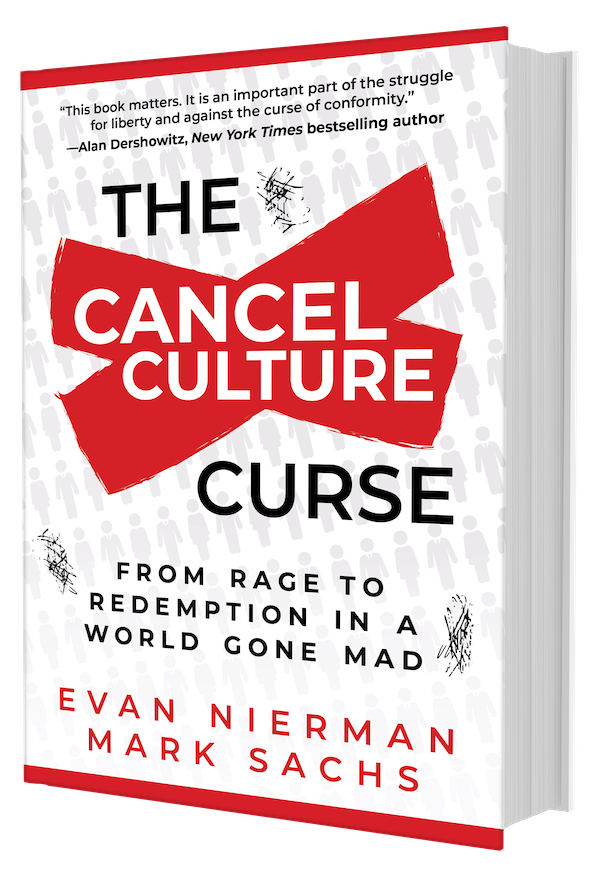PR ON THE GO April 21, 2023
Mastering Crisis Communication in a World of Cancel Culture
PRontheGO Expert Interview with Evan Nierman
Evan Nierman: The Cancel Culture Curse: From Rage to Redemption in a World Gone Mad
In The Cancel Culture Curse, global crisis manager Evan Nierman and his colleague Mark Sachs examine the impact of cancel culture in today’s media - driven world. The authors also explore the history of cancel culture and the trends that have fostered it, defining the telltale elements that are hallmarks of such campaigns.
We hope you enjoy our recommendations! Some may have been sent as samples, but all have been independently selected by our editors. FYI: PR ON THE GO and its publishing partners may earn a commission and/or other compensation from links on this page.
Enter the realm of crisis communication mastery with a true expert in the field - Evan Nierman. As the Founder and CEO of Red Banyan, a global public relations firm, Evan has spent 25 years guiding top-tier clients through complex high-stakes situations. With a client list that includes business executives, celebrities, and even presidential candidates, his expertise has been sought after by the media, cementing his reputation as a trusted resource for anyone seeking to learn more about effective crisis management.
“The Cancel Culture Curse: From Rage to Redemption in a World Gone Mad,” the new book title by Evan Nierman and his colleague Mark Sachs, recently hit shelves and online retailers. In a groundbreaking first, the authors identify the core elements of cancel culture campaigns, which can be used to distinguish them from instances of warranted outrage.
Drawing on their firsthand experience counseling some of the most well-known cases, the authors also address the debate around cancelation being a good or bad thing, provide all-new insight into the subject, and advise on what businesses and individuals should do when being faced with calls for cancelation.
Cancel culture is an insidious force in society today. In the seconds it takes to make one regrettable social media post—or wind up on the wrong side of a false accusation or misunderstanding—reputations, relationships, and careers are destroyed. Have we entered an era when people cannot make mistakes; where no apology or change of heart can ever deliver forgiveness?
Making a comeback used to be a celebrated American ideal. But have the roads to redemption been permanently blocked by internet mobs seeking vengeance?
- The Cancel Culture Curse book description
Interview with Evan Nierman
Get ready to learn from a true crisis communication veteran in this interview.
Louis C.K., Joe Rogan, Dave Chappelle, Jon Stewart, and Trevor Noah are all well-known figures who have faced controversy and criticism in the context of cancel culture. How do you assess these examples, and what can we learn from them in terms of the broader implications of cancel culture for free speech and societal discourse?
Several of these figures and their respective controversies are prime examples of cancel culture and representative of the core elements I outline in The Cancel Culture Curse. For example, Dave Chapelle’s “crime” was committed against a collective, the Trans community, and moral absolutism was ever-present by those seeking to end his career. The nature of his offense, jokes, could also be judged as trivial, seeing as Chapelle is known for going after all types of prominent figures and a range of groups.
Joe Rogan’s attempted cancelation arose from his hosting guests who questioned the safety and efficacy of COVID-19 vaccines, as well as his use of the N-word in certain contexts. The backlash against him and calls to end his career as one of the top podcasters in the world were disproportionate to his offenses. The controversy arose quickly as public figures including Neil Young and Joni Mitchell began pulling their music from Spotify, and the cancel vultures conveyed intense moral absolutism, expressing outrage.
Comedy provides value in that it is often a form of social commentary. Imposing limits on that commentary is detrimental, and another example of how cancel culture impedes the public discourse and free speech that often leads to bettering our society. Comedians force us to look at and laugh at ourselves, including facing down what can be ugly truths.
Comedians being controversial is not a new thing. The danger today is not what is said, but rather how it’s received and acted upon, as evidenced by several recent instances of physical violence on the stage.
You mention the "telltale elements" that are hallmarks of cancel culture campaigns. What are some of these elements, and how can individuals and businesses recognize when they are being targeted by a cancel culture campaign?
The six elements that are telltale signs of cancel culture at play can be remembered using the acronym CANDEM:
- Crime committed against a collective
- Arises and accelerates quickly
- Nature of the offense is trivial, minor, or fabricated
- Disproportionate response is enacted
- Everyone afraid to get involved
- Moral absolutism by those doing the canceling
PR ON THE GO Media Lists: Carefully curated journalist contacts and verified email addresses.
As a crisis management expert, how has the rise of cancel culture impacted the way you advise clients and handle crises?
Cancel culture completely changes the dynamics of many crisis engagements. Crisis communications has always demanded a fast-paced response, which is necessary to match the speed of today’s news cycle.
With the advent of cancel culture and rise in coordinated social media attacks, crisis management professionals need to work even faster, and have a skillset that allows them to effectively navigate those social media platforms where the controversy is growing in real time. Due to this, social media is now often front and center of crisis PR strategies for clients.
There is a wide range of scenarios in which individuals and businesses can become the targets of cancel culture, including rash social media posts, allegations of plagiarism, and even mistaken identities. Are there any common missteps that individuals or businesses tend to make when responding to a cancel culture incident?
A major common misstep is the decision to shy away from engaging with the media when under fire. Remaining silent while a controversy continues to gain attention allows cancel vultures to dictate the narrative that journalists will often run with. I’m a big believer in a practice I call “pressing the truth.” Press the Truth® means not just telling the truth, but aggressively getting the truth out into the public domain, so you can better control the narrative. In the context of cancel culture, it is important to assert your side of the story as aggressively as those trying to cancel you are asserting theirs.
Another common misstep is an ineffective apology. Apologies should only be made when truly warranted. If one is warranted, then the elements of a sincere and effective apology must be present. Key components to an effective, honest apology are:
-Acknowledging the wrong
-Taking responsibility for your words or deeds without blaming others
-Forgoing pandering or groveling
-Asking for absolution
-Following through on any pledges you make
-Avoiding repetition of the same offense
What are some best practices for crisis communication and reputation management that entrepreneurs should keep in mind, regardless of whether they are facing cancel culture or other types of crises?
It’s usually not a matter of if an organization will face a crisis, but rather when. Hiring a team of experts to perform a crisis audit of an organization and create a crisis plan to have in place is something I highly recommend, regardless of what the current public sentiment is. Whether or not a company is prepared can be of vital importance when a crisis inevitably occurs.
That preparation can include identifying any potential threats, a preferred communication method for media, as well as a designated spokesperson, and having an internal communications strategy in place.
Additionally, it’s always a good idea to have best practices outlined and policies in place for company leadership and employees to follow, especially regarding social media use and online sharing.
Something we forgot to ask, but you’d like to add.
We are all human and therefore we all make mistakes. Because of this, everyone is at risk of cancel culture. The average person, who usually doesn’t have a far-reaching public platform to combat misinformation, is most susceptible to the practice. Forgiveness and compassion are important societal values that cancel culture discourages. We should celebrate the ability of people to atone, improve and grow following mistakes.
The cancel culture curse is presently afflicting our society. But for the good of our nation, our culture, our world, and our future, we must band together to break the spell.
This book is neither intended to settle all arguments, nor to be the final word on this topic. I remain hopeful that it will spark more discussions, and ideally, contribute in some small measure to making the world a more positive and forgiving place.
Thank you!
Complementing the book’s release, the authors Evan Nierman and Mark Sachs have also launched the informational online hub, cancelculture.com.
#PRontheGO
Subscribe to our growthhacking newsletter.
Follow the latest PR hacks from our experts.

